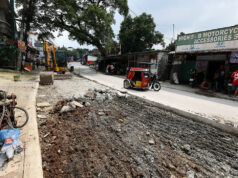Saudi attack’s inflation risk watched
By Luz Wendy T. Noble
SURGING WORLD OIL PRICES after attacks last Saturday on Saudi Aramco’s processing facilities could ignite inflation risks for the short term, even as the pace of overall price increase should stay well within the official 2-4% full-year target due to base effects, a senior official of the Bangko Sentral ng Pilipinas (BSP) and private economists said on Tuesday.
“This development represents an upside risk to the inflation outlook,” BSP Deputy Governor Francisco G. Dakila, Jr. said in an e-mail, even as he emphasized that “based on preliminary projections by BSP staff, inflation is still likely to remain within target for 2019.”
“We will continue to monitor the situation for new developments and will update our forecasts accordingly as we get more information, especially as we prepare for the meeting of the Monetary Board on the monetary policy stance on Sept. 26… As always, our decision on the monetary policy stance will depend on how these and other developments will affect our outlook for inflation.”
Bloomberg on Sept. 16 quoted BSP Governor Benjamin E. Diokno as saying that the attack on Saudi Aramco facilities and its market aftermath will form part of briefings at the Sept. 26 monetary policy review.
The attack is estimated to have halved the production of Saudi Arabia, the world’s top oil producer — or by about 5.7 million barrels a day — and cut global output by a fifth.
World oil prices spiked on Monday, with Brent crude logging its biggest intraday jump in nearly 30 years, or since the 1990-1991 Gulf crisis over Iraq’s invasion of Kuwait.
Philippine headline inflation has been easing from 2018’s multi-year highs to clock in at a three-year-low 1.7% in August, which took the year-to-date pace to three percent — the midpoint of the central bank’s 2-4% target for 2019. Inflation last year had logged successive multi-year highs to peak at 6.7% in September and October. It hovered in six-percent territory from August to November, helping to fuel 2018 inflation to a decade-high 5.2%.
For Security Bank Corp. Chief Economist Robert Dan J. Roces, “The speed by which Saudi Aramco will be able to restore supply levels will prove to be very crucial in the short to mid term as this will provide scope as to when (oil production) levels will normalize.”
At the same time, he said in an e-mail, “We still think inflation will be within BSP targets and below or at 2.0% probably until November on the back of base effects” from last year.
Saying that “[m]uch will depend on how quickly Saudi Arabia will be able to get production back on line,” Alex Holmes, Asia Economist at Singapore-based Capital Economics, said also via e-mail that “It’s likely that overall inflation in the Philippines will probably bottom out slightly higher than we had anticipated for Q4.”
“But with other factors, such as tumbling food price inflation, driving the headline rate downward, we still expect it to be below two percent for the rest of the year.”
For Jiaxin Lu, economist at Singapore-based Continuum Economics, “Whether or not plant production gets moving again, the event will still pull off some upside risk to inflation…”
“Oil prices are likely to remain elevated given geopolitical tensions and reserves use. Energy components take up roughly eight percent of the overall CPI (Philippine consumer price index) basket, which consists of fuel for motor vehicles and electricity utilities for residences,” Ms. Lu said.
“If crude oil prices stay elevated, it is likely to drive fuel prices up further in the Philippines. We expect high pass-through to inflation, with inflation likely drifting higher to the mid-point of BSP’s target range in Q3 and Q4,” she added.
“However, a beyond target inflation still seems unlikely at this stage.”
Also in an e-mailed response to queries, Rizal Commercial Banking Corp. Chief Economist Michael L. Ricafort said that as “electricity, gas and other fuels account for about 7.4% of the inflation basket, a potentially combined 15% share for inflation items are affected by higher oil/petroleum prices…”
“Despite some increase in global oil prices after the attacks on Saudi Arabia’s major oil production/export facilities, estimated inflation rate for the third and fourth quarter would continue to average below two percent, especially if the net increase in global crude oil prices would be limited to… a little over +US$10.”
UnionBank of the Philippines chief economist Ruben Carlo O. Asuncion pointed out that the Philippines get 12% of its petroleum supply from Saudi Arabia, sourcing bulk of requirements from the United Arab Emirates.
“If and when the disrupted oil supply from Saudi Arabia normalizes, this oil infrastructure attack is deemed a short-term disruption and has temporary impact on price levels,” he said.
“With the recent Saudi incident and its expected temporary nature, inflation is still expected, for both [third and fourth] quarters, to come in between 1.8% and 2.5%.”



